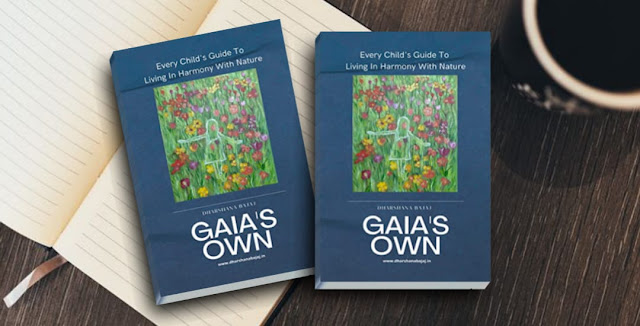Gaia’s Own is a uniquely written non-fiction book on Mother Earth, nature, environmental issues, climate change, and much more. The USP of the book is that it’s highly engaging while doling out the important messages and concerns to school children, young people, and teens. Written in a letter format – a school girl named Satvika exchanges communication via emails with her grandfather Yogesh, who is a nature photographer.
Satvika participates in ‘Earth Hour’ event in her school. She comes across many topics about our earth, which she further discusses with her grandfather, who is most of the time travelling across the world on his assignments. With personal elements attached, mini stories of duo are lovely, but this book doesn’t detour from its prime focus.
At first it sounds that Gaia is someone’s name…no it’s just another name for Mother Earth, as per the Greek cultural roots. The book discusses at length the progress of human race vs. living in harmony with nature. It needs no introduction that earth is exposed to exploitation by us on the name of globalization, progress, tech advancements, and etc. However, the stark reality is that now the biggest problem we are all facing is climate change.
“Climate change is the single biggest thing
that humans have ever done on this planet. The one thing that needs to be
bigger is our movement to stop it.”
– Bill McKibben
The first chapter opens up to discuss the importance of nature since the dawn of human civilization. Satvika writes to her grandfather, currently working in Brazil. Falling back on exemplary quotes and references from native tribes, grandfather asserts that the planet may reduced to a dry land or dead land if people now didn’t heed at it.
After every chapter, comes Gateway to Gaia – it talks about various aspects as per the preceding chapter that can bring harmony to humans with nature. The first one talks about spending time in nature. Similarly, after every chapter there is this part that briefly summarizes the previous chapter with beautiful quotes and maxims and references from various resources. Reading this part is extremely soothing to senses.
Stretching up to 10 chapters, the book brilliantly covers many burning issues to beautiful concepts that make or break our Mother Earth. It seems that the author is influenced by Native American Tribes, she often quoted things from their culture, including a few poems. The book covers all basic to intrinsic topics ranging from Chennai rains to Amazon forest fire to GHI to Paris Agreement to food, animals, trees, choices and love, and everything in between. In fact, it opens a gamut of issues and choices that needs our attention otherwise we may all suffer the consequences of current wrongdoings.
Dharshana Bajaj’s research and knowledge towards the nature, earth, and climate, cultural views is evident in the book. Every topic she writes with an iota of engagement with superb narrative skills. Other than stance on creating awareness on Mother Earth, the book can also be remembered for its wonderful sagacious quotes/wisdom. Some go below before we conclude the review.
Read a good book every day. Reading is also
a form of meditation, especially if the book is well-written, uplifting, and
positive. Reading improves your power of concentration and relaxes you as well.
Your diet is a bank account. Good food
choices are good investments.
When humanity serves nature, nature serves
humanity. When we serve animals and plants, they too serve us in return.
Study nature, love nature, stay close to
nature. It will never fail you.
Support and care for Mother Earth, kindly buy a copy of the book from Amazon/Kindle.

Comments
Post a Comment